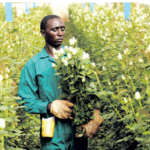The National Bureau of Statistics (NBS) has disclosed the recent GDP rebasing exercise has positioned the real estate sector as Nigeria’s third-largest sub-sector.
This shift sees real estate surpass crude petroleum and natural gas, traditionally dominant sectors, while trailing only crop production and trade in its contribution to the economy.
GDP rebasing is a vital process for aligning economic indicators with current realities. Adeyemi Adeniran, the Statistician General of the Federation, emphasized that the exercise enhances data accuracy, enabling informed policymaking and strategic planning.
The rebasing exercise, which adopts 2019 as the base year due to its relative economic stability, incorporates data from previously underreported sectors such as the digital economy, modular refineries, and health insurance.
- Advertisement -
By expanding the scope of measurement, the exercise provides a clearer picture of the economy’s structural changes, particularly the reduced reliance on oil and gas and the growing prominence of non-oil sectors.
In Q3 2024, the real estate sector recorded a 46.52% nominal growth compared to the same period in 2023. Despite this remarkable expansion, its contribution to real GDP slightly declined to 5.43% from 5.58% in the corresponding period of the previous year.
This performance highlights the sector’s resilience amid challenges such as inflation and declining purchasing power. The demand for housing remains strong, driven by an estimated 28-million-unit housing deficit, with experts suggesting Nigeria needs 700,000 new homes annually to bridge this gap.
Looking ahead, projections from Statista indicate the sector’s value could reach $2.61 trillion by 2025, with residential real estate leading the way.
The rebasing exercise has also led to significant shifts in Nigeria’s economic rankings. Telecommunications, now categorized as a standalone sector, ranks fourth, contributing 16.35% to GDP in Q3 2024.
- Advertisement -
Meanwhile, crude petroleum and natural gas, construction, and food, beverages, and tobacco occupy subsequent positions.
These adjustments reflect the diversification of Nigeria’s economy, highlighting the potential of emerging sectors alongside the sustained importance of traditional industries.










